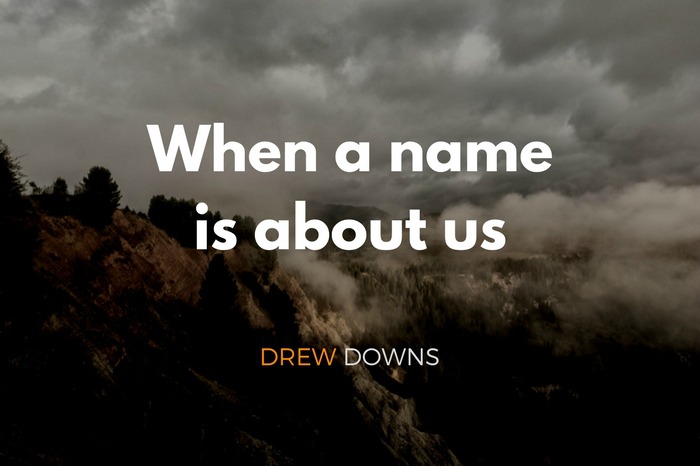5. Even the name given to Moses expresses “withness” saying I will be there howsoever I will be.
One of the worst kept secrets in the world is that God’s name isn’t “God.”
It’s like the town drunk who we we all know [wink, wink] doesn’t have a problem. We all agree to pretend like it is the name with the fierceness of belief like it actually is.
We know this is the case because we read Exodus 3 about Moses and the burning bush. And we read the revelation of God’s identity as I AM. Then we sing songs about “the great I AM” and teach other about the different names for God. Including the divine name transliterated as YHWH.
And if we’re in a church which values history, you’re likely to learn about the church’s use of a placeholder so as to avoid speaking that divine name; a tradition we’ve inherited from our Jewish cousins.
We know this and still insist on calling the Great Mystery by the placeholder name of God: so that God has become God’s name.
It’s a pretty arrogant thing for humanity to do if you think about it.
While I should stop prattling on about our issues with the divine name, let’s shift to the revelation of God’s identity. Because once we deal with that, we can see why all this junk I’ve described is also about something else.
The Revelation
You’ve probably heard the story before about God appearing to Moses in a bush and telling him to lead his people out of Egypt. And Moses is all “Whaaaaaat?” Then God’s all “You heard me.” And Moses is all “Buuuuuuuut…” and God’s all “Did I stutter?” but Moses is all “No, ’cause I stutter!” and God’s all “then take your brother.”
So after Moses keeps arguing back with God about how unworthy he is and how God must have picked the wrong person and God keeps reassuring Moses that yes, he did intend to pick him, Moses realizes how crazy this all would sound.
It makes sense, doesn’t it? Like we’d know what to say to someone about our encounter with God. He asks who he should tell the people sent him out.
And God says Tell them, I Am Who I Am has sent you.
It’s a weird defense, I think. But God didn’t ask me. God asked Moses. And God asked Moses to tell people about God’s relationship to them, rather than give out a secret codename.
But instead, people throughout history focused on the present/infinity character of this statement. God is not giving a name, but a truth claim. A claim which sounds like God is speaking to a present identity in the midst of an eternal certainty. I am who I am. Like God is saying “this is me.”
But this isn’t a complete translation. It doesn’t embody what God is actually promising.
I Will Be There
Everett Fox reimagines this common translation to better embody the character of what God was communicating.
The Hebrew isn’t a present truth claim. It is a now and future claim. It is not an expression of a physicality of the present (this right now is who I am and always will be) but a promise of a potentially evolving presence in the present and future.
So a better translation (though less elegant) would be
I-Will-Be-There-Howsoever-I-Will-Be-There
It evokes a present promise to a future connection.
It also names the character of God as being determined by God, rather than the eternity of this moment.
So God shows up in a burning bush to invite Moses into a collaboration of liberation. And God says, tell the people that the one who came to me in a bush will come to us again in a form of God’s choosing. Such as, let’s just say, a fire and a cloud. And, what the heck, how about as a baby.
But the central claim in this moment is that God will be there.
Frustrated in Egypt? There.
Wandering in the desert? There.
Trying to make a home? There.
Exiled in Babylon? There.
This promise will continue.
A “With” God and a “Without” Faith.
If this is what God communicated to Moses, how could we have inherited a faith so far from this?
We’ll be exploring this in the weeks ahead. But let’s today suffice to say that we have struggled with the question of a mighty, eternal God and a “With” God who is present in all adversity. It is far easier to believe in a God who stands tall, proclaiming This is who I AM! and forcing us all to our knees than a God who promises to always be there, not as we want, but as God wants.
Our addiction to power, not withstanding, it is also the nature of a tradition more focused on being consistent as a religion than to the precepts of the inherited faith.
It is far easier to comprehend a God who doesn’t need humanity at all, who acts without us. We could make sense of that. But a God who is with us and depends upon us to do our part? That junk seems crazy.
But that’s the very substance of our tradition.
[This is Thesis #5 of my 31 Theses. To read them all, visit the 31 Theses introduction page.]

